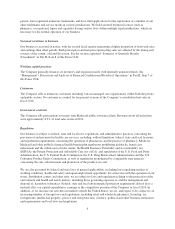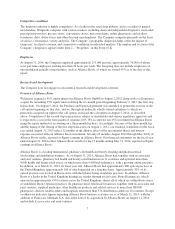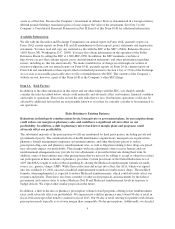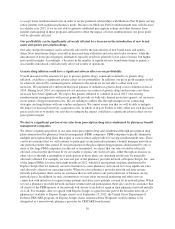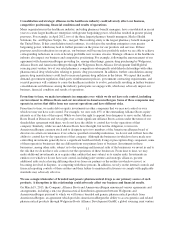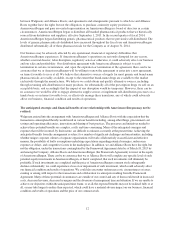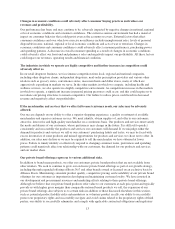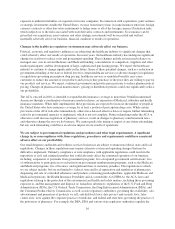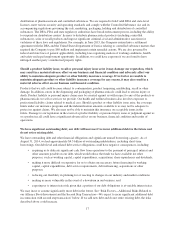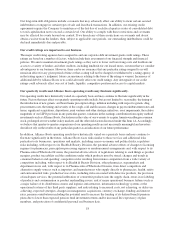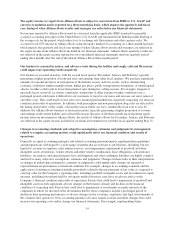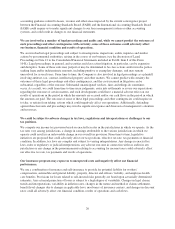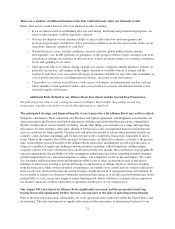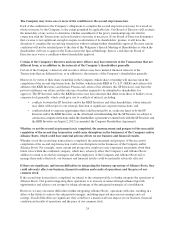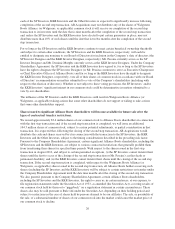Walgreens 2014 Annual Report Download - page 24
Download and view the complete annual report
Please find page 24 of the 2014 Walgreens annual report below. You can navigate through the pages in the report by either clicking on the pages listed below, or by using the keyword search tool below to find specific information within the annual report.exposure to unknown liabilities of acquired or investee companies. In connection with acquisitions, joint ventures
or strategic investments outside the United States, we may from time to time, in some instances enter into foreign
currency contracts or other derivative instruments to hedge some or all of the foreign currency fluctuation risks,
which subjects us to the risks associated with such derivative contracts and instruments. No assurance can be
given that our acquisitions, joint ventures and other strategic investments will be successful and will not
materially adversely affect our business, financial condition or results of operations.
Changes in the health care regulatory environment may adversely affect our business.
Political, economic and regulatory influences are subjecting the healthcare industry to significant changes that
could adversely affect our results of operations. In recent years, the healthcare industry has undergone significant
changes in an effort to reduce costs and government spending. These changes include an increased reliance on
managed care; cuts in certain Medicare and Medicaid funding; consolidation of competitors, suppliers and other
market participants; and the development of large, sophisticated purchasing groups. We expect the healthcare
industry to continue to change significantly in the future. Some of these potential changes, such as a reduction in
governmental funding at the state or federal level for certain healthcare services or adverse changes in legislation
or regulations governing prescription drug pricing, healthcare services or mandated benefits, may cause
customers to reduce the amount of our products and services they purchase or the price they are willing to pay for
our products and services. We expect continued government and private payer pressure to reduce pharmaceutical
pricing. Changes in pharmaceutical manufacturers’ pricing or distribution policies could also significantly reduce
our profitability.
The ACA, enacted in 2010, is intended to expand health insurance coverage to more than 30 million uninsured
Americans through a combination of insurance market reforms, an expansion of Medicaid, subsidies and health
insurance mandates. When fully implemented, these provisions are expected to increase the number of people in
the United States who have insurance coverage for at least a portion of prescription drug costs. While certain
provisions of the ACA took effect immediately, others have delayed effective dates or require further rulemaking
action by governmental agencies to implement, which is not yet complete. Future rulemaking under the ACA or
otherwise could increase regulation of pharmacy services, result in changes to pharmacy reimbursement rates,
and otherwise change the way we do business. We cannot predict the timing or impact of any future rulemaking,
but any such rulemaking could have an adverse impact on our results of operations.
We are subject to governmental regulations and procedures and other legal requirements. A significant
change in, or noncompliance with, these regulations, procedures and requirements could have a material
adverse effect on our profitability.
Our retail drugstore and health and wellness services businesses are subject to numerous federal, state and local
regulations. Changes in these regulations may require extensive system and operating changes that may be
difficult to implement. Untimely compliance or noncompliance with applicable regulations could result in the
imposition of civil and criminal penalties that could adversely affect the continued operation of our business,
including: suspension of payments from government programs; loss of required government certifications; loss
of authorizations to participate in or exclusion from government reimbursement programs, such as the Medicare
and Medicaid programs; loss of licenses; and significant fines or monetary penalties. The regulations to which
we are subject include, but are not limited to: federal, state and local registration and regulation of pharmacies;
dispensing and sale of controlled substances and products containing pseudoephedrine; applicable Medicare and
Medicaid regulations; the Health Insurance Portability and Accountability Act (HIPAA); the ACA; laws and
regulations relating to the protection of the environment and health and safety matters, including those governing
exposure to, and the management and disposal of, hazardous substances; regulations of the U.S. Food and Drug
Administration (FDA), the U.S. Federal Trade Commission, the Drug Enforcement Administration (DEA), and
the Consumer Product Safety Commission, as well as state regulatory authorities, governing the availability, sale,
advertisement and promotion of products we sell; anti-kickback laws; data privacy and security laws; false
claims laws; laws against the corporate practice of medicine; and federal and state laws governing the practice of
the profession of pharmacy. For example, the DEA, FDA and various state regulatory authorities regulate the
16


